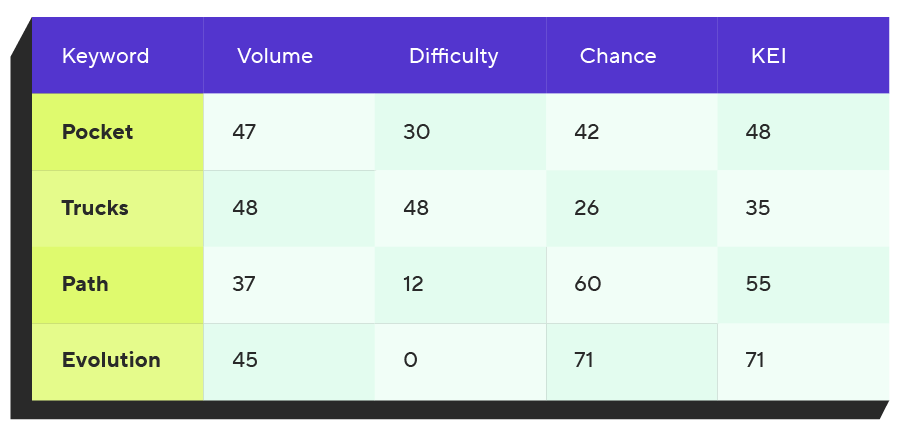
In our previous blog, we explored the systematic process of concept research and validation when developing new titles within established IPs. Today, we shift our focus to another crucial aspect: naming your game. While it may seem straightforward, the process is anything but random. At SuperScale, we employ a data-driven, methodical approach, evaluating various criteria to ensure we choose the most effective name for our games.
Title analysis of a new game
To begin the process of naming a new game title, we conduct a thorough analysis of relevant keywords that will form the title. This analysis includes several key metrics:
 Keyword volume
Keyword volume
- Keyword volume serves as a barometer of a term’s popularity among users. It quantifies how frequently specific keywords are searched, providing invaluable insight into user interests and trends. For mobile games, aiming for keywords with higher volume, typically ranging from 5 to 100, increases the visibility potential of your title.
 Keyword difficulty
Keyword difficulty
- Keyword difficulty measures the level of competition for a particular keyword, offering a glimpse into the challenges your game might face in ranking among the top search results. Scores on a scale from 0 to 100 indicate the intensity of competition, with higher scores signifying the presence of dominant apps competing for visibility.
 Chance
Chance
- Assessing the probability of your game ranking in the top 10 search results is crucial for gauging its potential success. The chance metric evaluates various factors, including keyword relevance, app performance, and market dynamics, to provide an estimate of your game’s competitiveness. A higher chance score signifies a stronger likelihood of achieving top rankings, translating into increased visibility and downloads.
 KEI Index – Keyword Efficiency Index
KEI Index – Keyword Efficiency Index
- Arguably the most critical metric in title analysis, the Keyword Efficiency Index (KEI) offers a holistic view of a keyword’s visibility potential for your app. By combining high keyword volume with a high chance score, the KEI index identifies keywords that present optimal opportunities for maximizing your game’s visibility and attracting a larger audience. Leveraging the KEI index enables you to strategically align your title with keywords that offer the greatest potential for success in the competitive mobile gaming landscape.
In summary, conducting a comprehensive title analysis that includes keyword volume, difficulty, chance, and the KEI index is key for driving the success of your game in the mobile app market.
Choosing
“Pocket Trucks: Route Evolution”
To illustrate our approach, let’s dissect the process behind selecting the name “Pocket Trucks: Route Evolution” for one of our recent games. During the brainstorming phase, we considered various options, including “Pocket Trucks Path Evolution,” “Semi Evolution,” “World Truck Sim,” “Road Evolution,” and “Route Evolution.”

Ultimately, “Route Evolution” emerged as the frontrunner, boasting the highest Keyword Efficiency Index. This choice aligned perfectly with our strategy of selecting a name that not only resonates with our audience but also maximizes our game’s visibility in the crowded mobile gaming market.
Summary
In the competitive landscape of mobile game development, choosing the right name is critical to success. At SuperScale, we don’t leave this crucial decision to chance. Instead, we leverage data-driven insights and methodical analysis to ensure that our game titles not only capture the essence of the gameplay but also resonate with our target audience.
By giving priority to factors such as keyword volume, difficulty, chance, and the KEI index, we
aim to optimize the visibility and discoverability of our games across app stores worldwide.







